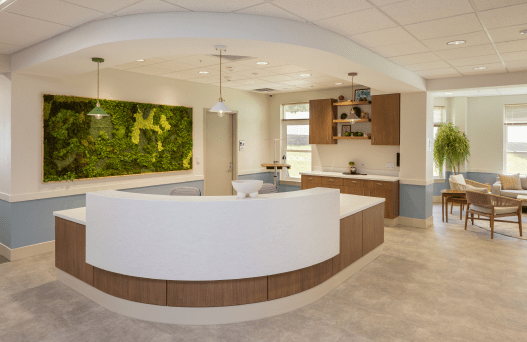Pursuing sobriety alone can be isolating and potentially dangerous. The most successful journey is one that begins with compassionate support.
The patient-focused and medication-assisted treatment at our Maryland drug rehab can make your recovery journey more comfortable and achievable.
What Is Substance Use Disorder (SUD)?
A substance use disorder or severe dependence is a complex mental health disorder that impacts the brain and behavior. SUD is characterized by substance use that is out of control. If left untreated, this disorder will negatively impact brain chemistry, wiring, and function.
From alcohol and prescription medications to street drugs and party drugs, these substances can derail your life, your relationships, and your goals. A SUD can also lead to numerous health problems that range from moderate and severe to life-threatening.
The Diagnostic and Statistical Manual of Mental Disorders (DSM-5) officially describes the criteria for substance use disorder as occurring when more than two of the following symptoms are present:[1]
- Hazardous substance use
- Social or interpersonal issues related to substance use
- Neglecting major roles due to substance use
- Legal issues related to substance use
- Experiencing withdrawal
- Developing substance tolerance
- Increasing dosage or frequency
- Repeated attempts to reduce or manage substance use
- Much time spent using substances
- Physical and/or psychological problems due to substance use
- Usual activities neglected to use of substances
- Cravings for the substance
If you or a loved one exhibit two or more of these behaviors, you may have a substance use disorder.
Substance Use Disorder Treatment Process
From admission to discharge, each patient receives diagnosis-specific treatment from field experts attending to their needs 24/7. The process of SUD treatment involves multiple levels of care, from medical detox, case management, and inpatient rehab to medically managed care and long-term aftercare plans.
During the full continuum of care, patients will participate in behavioral health services, holistic therapies, group counseling, family therapy, individual counseling, and long-term recovery support services to establish new habits and create a healthy future.
Types of Substance Use Disorder Treatments
Taking advantage of substance use disorder treatment helps individuals stop using harmful substances and maintain a safe and sober lifestyle. By building new and healthier habits, you can restore productive functioning at work, home, and in society. Our substance use disorder programs include some or all of the following interventions:

Medical Detox

Detoxification can be an uncomfortable but essential process that is the first phase of recovery. However, on its own, it is insufficient to create lasting recovery and long-term sobriety. It’s critical to maintain treatment after attending our detox in Maryland to create a healthier future.[2]

Medication-Assisted Treatment

Nausea, diarrhea, vomiting, anxiety, and insomnia are common symptoms that make early recovery uncomfortable without medical intervention. MAT, or Medication-Assisted Treatment, is a medical intervention that helps to alleviate many symptoms of withdrawal.
Medications also help to reduce cravings and create a smoother detox and recovery process. While MAT therapy is not a good fit for everyone, it is part of many SUD treatment programs.

Inpatient Rehab

When you receive inpatient substance abuse treatment, you’re free to focus solely on your recovery efforts. Here, there are no distractions. No daily responsibilities. No negative influences. Nothing to hold you back and everything propelling you forward.

Medically Managed Care

If you’re concerned about other medical conditions keeping you from seeking treatment, medically managed care can alleviate those concerns. With a full medical staff, underlying medical conditions like diabetes, fibromyalgia, and chronic pain can be treated simultaneously.

Dual Diagnosis Treatment

While a substance use disorder is also a mental health disorder, it often coexists with other mental health concerns such as anxiety, depression, or PTSD. Each can intensify the symptoms of the other or worsen their course over time. It’s critical to address each one individually to achieve lasting healing.
Therapies Used in the SUD Program
There are a number of evidence-based therapies that offer beneficial treatment and relief for substance use disorder. One or more of the following may be incorporated into multiple levels of care services:
Hasin, D. S., O’Brien, C. P., Auriacombe, M., Borges, G., Bucholz, K., Budney, A., Compton, W. M., Crowley, T., Ling, W., Petry, N. M., Schuckit, M., & Grant, B. F. (2013, August). The American journal of psychiatry. DSM-5 criteria for Substance Use Disorders: Recommendations and Rationale. Retrieved from https://www.ncbi.nlm.nih.gov/pmc/articles/PMC3767415/ on May 30, 2023
National Institute on Drug Abuse (NIDA) (n.d.-f). Principles of Drug Addiction
Treatment: A Research-Based Guide (Third Edition). Retrieved from https://nida.nih.gov/sites/default/files/podat-3rdEd-508.pdf on 2024, July 3.
Substance use disorder – statpearls – NCBI bookshelf. (n.d.-h). Retrieved from https://www.ncbi.nlm.nih.gov/books/NBK570642/ on May 30, 2023
What’s the Best Way to Find Substance Use Disorder Treatment?
There are several ways to find substance abuse treatment facilities, including speaking directly with your doctor or therapist, searching the database provided by Substance Abuse and Mental Health Services Administration (SAMHSA), calling a drug addiction helpline, or asking trusted friends and family for a referral.
Find A SUD Program Near Me
Facilities that specialize in substance use disorder treatment
Click on a pin to learn more information on a specific facility location
Symptoms of Substance Use Disorder
While each substance use disorder can also be identified by its own set of unique symptoms, common SUD symptoms include:[3]
- Cravings
- Flu-like symptoms (withdrawal)
- Increasing doses or frequency (tolerance)
- Falling behind at work, school, home, or in life
- Reckless behavior (high-risk use)
- Continued use despite negative consequences
- Time and money spent on substances
- An inability to stop
If you or a loved one are struggling with two or more of these symptoms related to substance use, contact Alpas Wellness today and get the support you need to recover safely.
Cost of SUD Programs
The cost of attending residential treatment will depend on each person’s individual treatment plan. A number of other factors to consider include the severity of the disorder, the treatment plan required, the need for simultaneous medical services, and the eligibility for Medicaid, Medicare, or other health insurance coverage. Call the Alpas Wellness admissions team to learn more and verify your insurance.
Frequently Asked Questions about SUD Programs
Can I bring my phone?
Due to the nature of substance use disorders and to promote the success of treatment, no. We do not allow detox or residential patients to keep their phone or laptop with them.
How long does a SUD program take?
The timeline will be unique for each individual. However, most participants complete their treatment program in 30 to 90 days.
Can I smoke or vape inside?
No, smoking or vaping inside is not allowed, but there will be designated areas where you will be free to smoke or vape.

